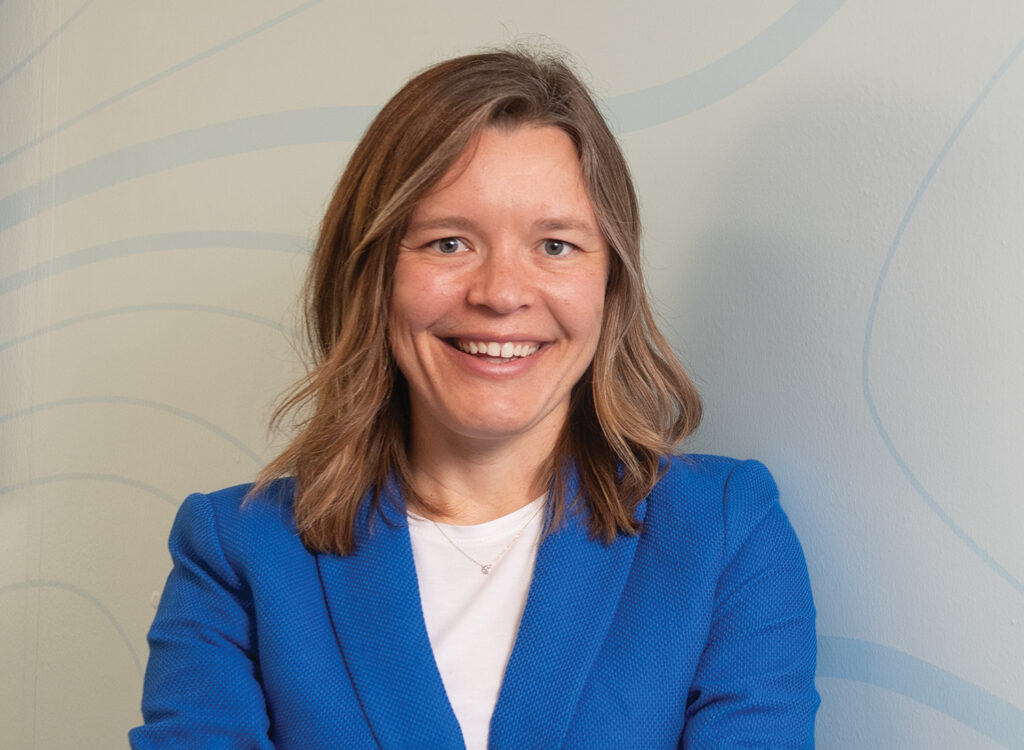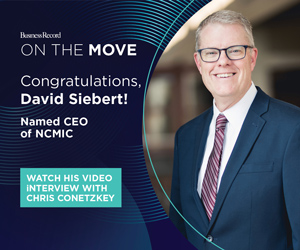A Closer Look: Nadilia Gomez
Executive director, Iowa AgriTech Accelerator

KATE HAYDEN Sep 5, 2019 | 6:09 pm
5 min read time
1,302 wordsBusiness Record Insider, Energy, Innovation and Entrepreneurship
Now the executive director at the Iowa AgriTech Accelerator, Nadilia Gomez grew up in Panama City, Panama, but developed a passion for agriculture as she visited her grandmother’s hometown, a small farming community without electricity where her family took a 45-minute walk to their water source.
Gomez was inspired to pursue her master’s and Ph.D. studies at the University of Minnesota by Norman Borlaug, who accomplished a significant amount of work and research at the university. Though she intended to create new, high-yielding seed varieties, Gomez developed an interest in predictive analytics applications in agriculture. She spent eight years at DuPont Pioneer developing data-driven solutions for agricultural support services, and most recently was a senior research scientist at Corteva Agriscience.
Gomez is also a member of the South Central STEM Industry Advisory Board and is an experienced keynote speaker in STEM topics. Despite her background in deeply studying plant genetics and breeding practices, Gomez says she is a “terrible” gardener – but one of her favorite places in Iowa is the Greater Des Moines Botanical Garden.
What was your background before coming to the Iowa AgriTech Accelerator?
I’ve been formally trained as a plant breeder and geneticist, but I’ve never been a conventional one. Even being part of that plant breeding space, my interest was really on helping individuals make decisions. … So whether it is for breeders, for molecular breeding scientists, for agronomists or farmers, I’ve always been involved in teams that develop analytical insights for the prediction of decision-making.
What drew you to this role?
In this journey, I have interacted in small, multidisciplinary teams that develop prototypes. That rapid iteration, I think, is extremely powerful to deliver products and services that a customer will need. I was intrigued by these rapid iterative processes of testing new hypotheses, whether they are hypotheses and technology or scientific areas, or whether they are business hypotheses – do I have a product that I can sell?
The opportunity to go from a corporate setting to the entrepreneurial space is fascinating to me. The ability to connect large and small companies that are interested in the agricultural space is fascinating. The multidisciplinary, diverse environments that are necessary to make these projects successful is exciting. The opportunities that we have right now in Iowa, the critical mass that is forming around what the agtech space could look like in the future – the timing is right for this.
When I had the opportunity to learn more about the executive director role, I could see all of my training from the scientific and technological space, my involvement in developing digital solutions and understanding the technologies associated with it. … I thought that was an exciting opportunity I wouldn’t want to pass up on.
What is the best piece of advice or helpful comment that you’ve gotten so far starting this role?
I’m really fortunate that the individuals that have laid the foundation for the accelerator are passionate and engaged. All of them have provided useful feedback regarding the future of the accelerator, but they’re not only saying, “As an executive director, you should do this or that.” They are the type of folks that are rolling up their sleeves and saying, “I’m right there with you; I am going to help you make this possible.”
What I have is a dynamic team of individuals that have already been forming that foundation, building it from the conceptual stage to where we’re at now. Then they’re opening up and inviting me to contribute to that space. That is a unique opportunity, and it’s very motivating.
What goals do you have for the accelerator’s future?
I would love startups from all over the world to see the Iowa AgriTech Accelerator as their first option for developing agtech business ideas. … We are going to improve the quality of the startups coming in, we’re going to recruit more startups. We are going to bring in new investors that also want to maintain that same vision for the future of agriculture technology in the area. Hopefully, we will position the Iowa AgriTech Accelerator as the preferred agtech accelerator for startups worldwide.
Right now our startups have a variety of options to consider some of the unique attributes that the accelerator brings to the table, including the 90-day program with excellent mentors. One of the things that we will continue to develop is our mentor pool. Another thing that is a big opportunity for them is the engagement with our ag community. I want to bring investors that have a passion for developing that community, so more investors would be a good idea, a good signal of our growth and progress.
The quality of those startups should also improve over time. We want startups that have a prototype that is ready for testing a business idea that is palatable to the investors in our area. I think that those are some of the metrics of success that we could imagine not only for the next year, but for years to come.
Why were you so drawn to these types of careers?
I don’t think there is a job more impactful than that of a farmer. I think that there are very few other jobs that have the level of uncertainty and risk associated with their operations. Sure, there is a lot of uncertainty and risk that farming operations face every year, year after year. I also believe that the timing is right for a new approach to agriculture, where the next generation of farmers is taking on these big, impactful and highly uncertain jobs, [and] have technology available that could help those risks be more manageable.
This is a space that is ripe for innovation, and I am extremely passionate about the opportunities I can see ahead … by combining large companies that are well-known and established in this space, with tech giants, emerging startups, visionaries for what that agricultural space could be in partnership with that farmer saying, “Here are major pain points.”
How closely do you expect to work with regional farmers? Is that a connection made within the accelerator right now?
We are very fortunate [that] a lot of the mentors and the partners that we have established along the way have historical connections with farmers in the region. Many of our startups have the opportunity to test out their prototypes in those farming operations. It is always important to engage those early adopters in the co-creation of new technologies. I have had the opportunity to visit farmers, multigenerational farming operations – and to start to identify those trends that are changing within the farming community has been really influential in the prioritization of projects that I’ve been engaged in in the past. I think that is very valuable, and I certainly encourage us to continue to facilitate that for the startups.
Is there anything that you’ve been reading, watching or listening to lately that’s on your mind?
One of the recent topics I’ve been exposed to is the concept of thinking about your life as a design concept. Two professors put together a book, it’s called “Designing Your Life” [by Bill Burnett and Dave Evans]. The concept is that you as an individual are a multitude of options, and you learn with every decision and every choice that you take on, whether it’s at a personal level, whether it’s in your job, whether it’s in a relationship, you’re learning something about yourself as you go through that.
I think that this book … allows me to unlock these doors that may have been in my mind closed, because, well, I wasn’t trained under this particular idea or domain. When I took the first technology job, I remember thinking, can I do this? It’s the same concept.









